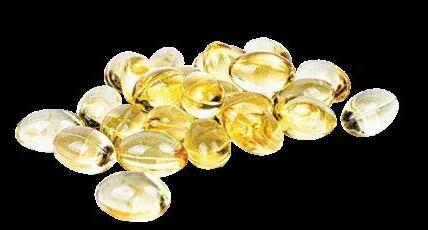
7 minute read
BERRY YOURSELF IN NUTRITION
Food For Fitness | 2022 BERRY YOURSELF
IN NUTRITION
Advertisement
Eat a handful of berries and you’ll be rewarded with a burst of sweetness in your mouth.
They’re as good for breakfast as they are for dessert. Research shows that berries deliver many benefits, including bettering cognitive health, helping prevent cancer, and lowering blood pressure. So, snag some blueberries, strawberries, raspberries, and blackberries and start making them part of your daily diet. Here are some of the potential benefits of berries.
LOADED WITH ANTIOXIDANTS Berries are a great source of antioxidants, such as anthocyanins, ellagic acid, and resveratrol. In addition to protecting your cells, these plant compounds may reduce disease risk. One study showed that blueberries, blackberries, and raspberries have the highest antioxidant activity of commonly consumed fruits, next to pomegranates.
MAY HELP IMPROVE BLOOD SUGAR AND INSULIN RESPONSE Berries may improve your blood sugar and insulin levels. Test-tube and human studies suggest that they may protect your cells from high blood sugar levels, help increase insulin sensitivity, and reduce blood sugar and insulin response to high-carb meals.
BERRIES CAN HELP YOU LOSE WEIGHT Berries are low in calories and that means you can load up on them without packing on the pounds. Because they are juicy they contain a lot of water, so much of their mass is really water, which contains no calories at all. A medium sized strawberry has between three and six calories. A cup of blueberries has only about 80 calories.
HELP FIGHT INFLAMMATION Berries have strong anti-inflammatory properties. Inflammation is your body’s defense against infection or injury. However, modern lifestyles often lead to excessive, long-term inflammation due to increased stress, inadequate physical activity, and unhealthy food choices. This type of chronic inflammation is believed to contribute to conditions like diabetes, heart disease, and obesity.
MAY HELP LOWER CHOLESTEROL LEVELS Berries are a heart-healthy food. Black raspberries and strawberries have been shown to help lower cholesterol in people who are obese or have metabolic syndrome. What’s more, berries may help prevent LDL cholesterol from becoming oxidized or damaged, which is believed to be a major risk factor for heart disease.
FREE DATE CHANGES
FROM $1,849 $1,599 *
FROM $1,949 $1,699 *

CRIMSON CANYONS & MESAS NATIONAL PARKS TOUR

10 days, departs April - September 2022
Las Vegas • Grand Canyon • Bryce Canyon • Zion • Capitol Reef • Arches & Canyonlands •
Grand Junction • Denver and more — Prepare to be awed as you experience the stunningly red rocks of these 6 iconic southwestern national parks. Travel through deserts, forests, mountains, and to the very edge of the Grand Canyon on this breathtaking tour.
FROM $1,949 $1,699 *
FREE ONBOARD CREDIT
GRAND ALASKAN CRUISE & TOUR
12 days, departs May - September 2022
Seattle • Vancouver • Ketchikan • Juneau • Skagway • Glacier Bay • Anchorage • Denali National Park • and
more — Visit Denali National Park and Glacier Bay National Park on the same incredible trip! Cruise through the Gulf of Alaska and the Inside Passage as you discover the best of the Frontier State by land and by sea.
FROM $2,549 $2,299 *

BEST OF IRELAND

12 days, departs April - October 2022
Dublin • Waterford • Cork • Killarney • Galway • Ring of Kerry • Cliffs of Moher • Sligo • Belfast •
Giant’s Causeway — Take the ultimate trip around the legendary Emerald Isle! Experience the magnificent sights that are the Cliffs of Moher and the Giant’s Causeway, the fairytale castles of Blarney and Bunratty with our expert local driver guide.
BEST OF HAWAII FOUR-ISLAND TOUR
12 days, departs year-round Oahu • Hawaii Island • Kauai • Maui — Enjoy a fully guided 4-island Hawaiian vacation with centrally located lodging in Waikiki on Oahu, and beachfront lodging on the “Big Island” of Hawaii, Kauai, and Maui. Guided throughout by our friendly Tour Directors—your local experts. Includes 3 inter-island flights.
TM
promo code N7017 CALL 1-866-575-0012
Mind & Body | 2022 MORE THAN THE SUNSHINE VITAMIN

HAVE YOU CHECKED YOUR VITAMIN D LEVEL?
UV Rays and Vitamin D
By Ram Rao, Ph.D., principal research scientist for Apollo Health
The advent of the winter season is marked by a deficiency of Vitamin D due to less outdoor activities resulting in poor exposure to the sun’s UV rays. Humans tend to spend less time outside during the colder months, which means less exposure to sunlight and heightened levels of Vitamin D deficiency. As cold and flu cases rise in the chillier months coupled with the continued presence of the COVID virus, we all need to be concerned about developing a weak immune system due to low Vitamin D levels.
Vitamin D, also known as the “sunshine vitamin” is a fatsoluble vitamin that is produced in the skin in response to sunlight and is required to keep our bodies functioning to their maximum potential. This fat-soluble vitamin belongs to a family of compounds that includes vitamins D-1, D-2, and D-3. In addition to sunlight-associated synthesis, Vitamin D is also obtained through certain foods and supplements. An optimal level of Vitamin D is necessary for overall growth and for improving immunity. The beneficial role of Vitamin D on the skeletal system by regulating the absorption of calcium and phosphorus has long been appreciated. Recent studies suggest that optimal levels of Vitamin D may improve outcomes after a cancer diagnosis, lower inflammation, and reduce the risk of inflammatory diseases.
Chronic inflammatory conditions, including but not limited to inflammatory bowel disease, cardiovascular disease, asthma, chronic kidney disease, non-alcoholic fatty liver disease, neurodegenerative diseases, all feature low levels of Vitamin D. This suggests an inverse relationship between optimal levels of Vitamin D and the risk of ill-health and disease. A low Vitamin D status is also associated with increased risk and unfavorable outcomes of acute infections. There is also sufficient evidence to suggest a connection between low levels of Vitamin D and an increased risk of food-based allergies. Similarly, if you are experiencing high blood pressure, or if you’re trying to reduce your risk of diabetes, heart attacks, rheumatoid arthritis, multiple sclerosis, or Parkinson’s disease, then check your levels of Vitamin D and ensure that you have optimal levels of this important vitamin.
A growing body of epidemiological evidence suggests a close relationship between Vitamin D deficiency, Alzheimer’s disease, and cognitive decline. Vitamin D plays an important
role in brain health and function and exerts various neuroprotective effects in brain areas essential for cognition. Low levels of Vitamin D are associated with a more than twofold increased risk of developing dementia. Subjects with low Vitamin D levels display slower informationprocessing speed, and this correlation is even stronger among subjects older than 60 years. Mechanistic studies now point to the role of Vitamin D in mediating thetranscription of hundreds of genes involved in cellular processes such as neuroplasticity, the immune system, tumor formation, cardiovascular disease, and calcium regulation. HOW TO UNCOVER DEFICIENCY? The most accurate way to measure the levels of Vitamin D is a blood test for 25-hydroxy vitamin D. While a level of 20 ng/ml to 80 ng/mL is considered normal for healthy people; it is advisable that your levels are in the optimal range (5080ng/ml). If you’re diagnosed with a Vitamin D deficiency, you will need to improve the levels to ensure optimal levels of this vitamin. At Apollo Health, we suggest the “hundreds rule to maintain optimal levels of Vitamin D”-- : Subtract your current Vitamin D level from your target level, and multiply by 100 to determine your approximate dosage: for example, if your target is 70, and your current level is 20, then 70-20= The two main dietary forms of Vitamin D are D2, found in fungi and yeast, and D3, found in aquatic and land animals. Seafood including salmon, sardines, herring, mackerel (preferably wild-caught), red meat, egg yolks, and fortified foods (healthy dairy, fat spreads, and breakfast cereals) are rich sources of Vitamin D. Sun-dried, and UV radiationexposed mushrooms are a rich source of Vitamin D and other essential vitamins, including vitamins B6 and B12. Vitamin D-enhanced mushrooms possess substantial amounts of bioavailable Vitamin D and are ideal for those following a flexitarian or plant-based diet. Taking your Vitamin D pills with some good fats (such as avocado, nuts, or fish oil) ensures maximum absorption.
In addition, remember, sunshine is the best medicine, so even if it is a cold, blustery day, step outside, get some sun, and improve your Vitamin D levels now and through the next year.

Learn more at apollohealthco.com/.











